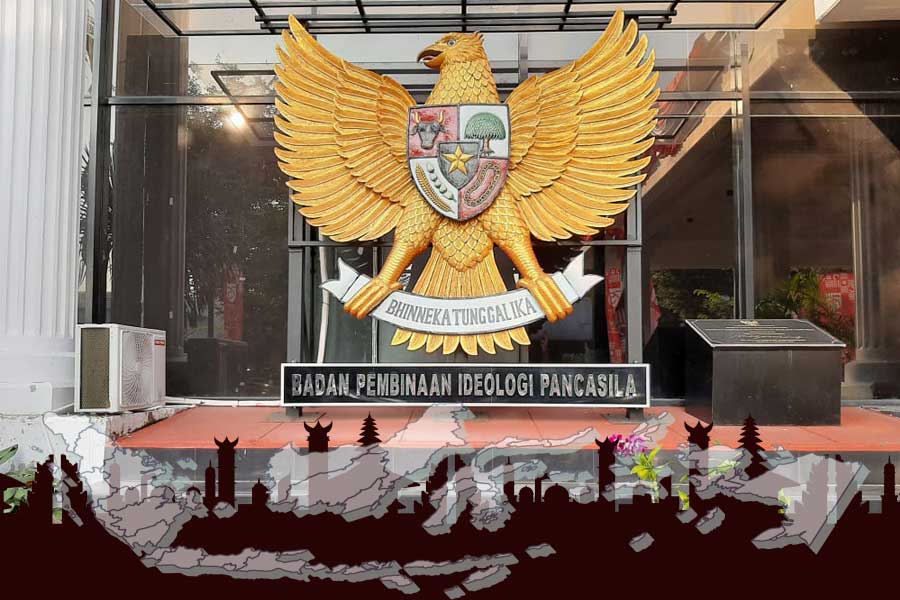BPIP RI: Guardians of Pancasila for the Future of NKRI

By: Prof. Dr. Drs. Ermaya Suradinata, S.H., M.H., M.S.
Editor: Dhania Puspa Purbasari
The Pancasila Ideology Development Agency (BPIP) is a vital institution to strengthen the role of Pancasila as the state ideology. In an era of globalization that is full of challenges, strengthening the role and function of the institution, which is led by the Chairperson of the BPIP Steering Committee Prof. Dr. (H.C.) Hj Megawati Soekarnoputri, who is also the 5th President of Indonesia, is very important to ensure that Pancasila remains relevant.
The establishment of BPIP is a transformation of the Presidential Working Unit for Pancasila Ideology Development (UKP-PIP) based on Presidential Regulation No. 7/2018. For this reason, strengthening the role and function of BPIP is very important for the future of the Unitary State of the Republic of Indonesia (NKRI). In addition, in facing the era of globalization that is full of challenges and dynamics, BPIP has a great responsibility to ensure that Pancasila remains the moral and ethical foundation in the life of the nation and state.
As an institution tasked with fostering the ideology of Pancasila, BPIP must continue to adapt and develop effective strategies to maintain the relevance and application of Pancasila in an increasingly complex society. So the revitalization of the Pancasila education curriculum is a top priority in strengthening the role of BPIP. A curriculum that is relevant to the times is developed to ensure that the younger generation understands and practices the values of Pancasila.
Then the strengthening of research and development is also increased to deeply understand the application of Pancasila in society. BPIP also conducts comprehensive research to identify various social and political dynamics that affect the implementation of Pancasila. The results of this research provide a strong basis for producing evidence-based policy recommendations. Thus, BPIP can formulate more effective and targeted strategies in fostering the ideology of Pancasila in society.
BPIP is also required to make maximum use of digital media for socialization and education about Pancasila. In this digital era, social media and other online platforms are very effective tools for disseminating information. BPIP strives to create interesting and easy-to-understand content to educate the public about the values of Pancasila. In addition, involving the younger generation in digital campaigns as their involvement will help spread Pancasila values more widely and quickly.
Then multisectoral collaboration with government agencies, the private sector and civil society is strengthened. From here it becomes clear that fostering the ideology of Pancasila is not only the responsibility of BPIP, but also the shared responsibility of all elements of the nation. Cooperation with government agencies will ensure strong policy support.
Meanwhile, the involvement of the private sector through Corporate Social Responsibility (CSR) programs can make a significant contribution in supporting BPIP programs. Civil society is also actively involved to ensure that the values of Pancasila are truly applied in daily life.
By implementing these strategies, BPIP is able to face the challenges that exist in order to strengthen the role of Pancasila as the state ideology. These steps ensure that Pancasila remains relevant and becomes the main guide in the life of the nation.
Thus strengthening the role and function of BPIP ensures that Pancasila remains the moral and ethical foundation in the life of the nation and state. This is very important to maintain national identity, and ensure that all policies and actions of the government and society are based on the values of Pancasila.
Pancasila as the state ideology has an important role in protecting the nation from the influence of foreign ideologies that may conflict with Indonesian national values. Therefore, BPIP ensures that Pancasila remains an effective shield in the face of various ideological challenges from abroad. This will also help maintain national ideological sovereignty and ensure social and political stability in Indonesia.
A strong BPIP will undoubtedly be able to create a society that is more tolerant, has integrity and justice. Tolerance is one of the core values in Pancasila, and through effective education and socialization programs, BPIP will instill these values in people’s daily lives. Integrity and justice will also be strengthened, making Indonesian society more solid and harmonious in the face of various challenges, both from within and outside the country.
To realize these goals, support from various parties is needed, considering that strengthening the role and function of BPIP is a strategic step to ensure that the Pancasila ideology remains relevant and able to answer the challenges of the times.
Through education, research, socialization, and effective cooperation, BPIP can contribute significantly to maintaining and strengthening the Republic of Indonesia based on the values of Pancasila. This strengthening also ensures that Pancasila must be the main foundation in nation building, as well as the adhesive of Indonesia’s unity and integrity in the midst of changing global dynamics.
Prof. Dr. Drs. Ermaya Suradinata, S.H., M.H., M.S. was Governor of Lemhannas RI (2001-2005) and Director General of Social Politics of the Ministry of Home Affairs (1998-2000). He is currently Chairman of the Board of Trustees of the Center for Geopolitics & Geostrategy Studies Indonesia (CGSI), Chairman of the Expert Council Team of the Indonesian Pancasila Ideology Development Agency (BPIP).
